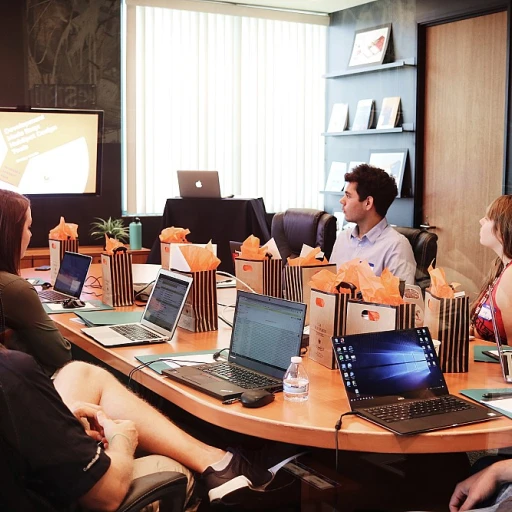
Understanding the HCM Consultant's Role
Defining the HCM Consultant's Impact
In the evolving landscape of talent management, the role of an HCM consultant is pivotal. These professionals are the linchpins in ensuring that human capital management systems, such as Workday and Oracle HCM, are effectively implemented and utilized. Their expertise is not just limited to technical know-how but extends to understanding the intricacies of workforce dynamics and employee engagement.
HCM consultants are often tasked with the integration of cloud-based solutions, which are becoming increasingly popular in the United States and beyond. With businesses moving towards remote operations, the demand for HCM consultants who can navigate these changes is on the rise. They play a crucial role in aligning technology with business objectives, ensuring that the workforce is managed efficiently and effectively.
Bridging Technology and Human Resources
The consultant's role is not just about technology implementation; it involves a deep understanding of human resources and change management. They work closely with senior management to ensure that the transition to new systems like Workday HCM or Oracle Fusion is smooth and beneficial for all stakeholders. This involves training employees, managing payroll systems, and ensuring compliance with regulatory standards.
Moreover, HCM consultants provide advisory services that help businesses navigate the complexities of talent management. Their insights are invaluable in crafting strategies that enhance employee satisfaction and retention, which are critical components of successful human capital management.
For more insights into how integrated corporate services play a role in talent management, you can explore this detailed exploration.
Key Skills and Competencies
Essential Abilities and Knowledge for an HCM Consultant
In the realm of talent management, an HCM consultant plays a pivotal role, requiring a specific set of skills and competencies. These abilities are essential for ensuring effective solutions in human capital management implementations, whether it involves Oracle HCM, Workday consultant, or other systems.
- Technical Proficiency: Having an in-depth understanding of Workday HCM, Oracle Fusion, and other HCM cloud solutions. This involves not only knowing how to operate these platforms but also understanding the intricacies of cloud-based ERP systems and their applications in different contexts, such as the public sector or specific industries.
- Business Acumen: A successful HCM consultant knows the dynamics of modern capital management and strategic change management processes. They bring insights that help align human resources practices with business goals, fostering growth across sectors from advisory services to enterprise-level companies.
- Interpersonal Skills: Consulting is often a human-centric field—managing employee expectations, conducting training sessions, and influencing workforce transition strategies. Exceptional communication and negotiation skills facilitate seamless implementation and enhance payroll and employee relations.
- Problem-Solving Abilities: HCM consultants are strategic thinkers who anticipate challenges such as remote work scenarios and united states consultant jobs market trends. Problem-solving skills are critical, especially in situations requiring swift decision-making.
- Continuous Learning: The landscape of human capital technology evolves rapidly with innovations like Oracle HCM and Workday updates. Staying informed about emerging trends is crucial. For those interested in enhancing skills further, consider mastering HRM forecasting to guide talent management effectively.
These skills enable an HCM consultant to navigate the complexities of united and international markets, contributing to successful jobs outcomes and reinforcing an organization's strategic vision.
Challenges in Talent Management
Overcoming Challenges in Modern Talent Management
Navigating the complexities of talent management requires a seamless blend of expertise, adaptability, and cutting-edge technology. HCM consultants in particular face unique challenges in aligning human resources practices with overarching business goals.
A significant hurdle is managing the change associated with the implementation of new systems, such as cloud-based HCM solutions. Transitioning to platforms like Workday HCM or Oracle Fusion requires careful planning and execution. Consultants must not only facilitate smooth transitions but also ensure ongoing support and training for existing staff, preparing them to leverage new technology effectively.
- Remote transitions: As more ERP implementations occur in the cloud, managing remote systems and maintaining efficient workflows is essential. HCM consultants must provide guidance to optimize remote transitions, particularly within the public sector and remote job environments often found in the United States.
- Employee engagement: Sustaining high levels of employee engagement remains a priority. Consultants play a crucial role in devising strategies that unite employees with human capital management goals, using tools like Oracle HCM Cloud to enhance workforce motivation and retention.
- Adaptability and training: Given the rapid evolution of technology, real-time training and skill development become indispensable. HCM consultants are tasked with implementing ongoing training programs, ensuring employees are well-equipped to navigate dynamic environments.
- Cultural shifts: Shifts in corporate culture, particularly towards a more agile and inclusive climate, require thoughtful strategies from HCM consultants. Managing these cultural shifts while integrating systems like Workday is a critical aspect of their advisory services.
The effective management of human resources during these transitions can significantly influence the success of an enterprise. Translating opportunities into actionable results is the key focus area for HCM consultants, as they continue to align strategic goals with tangible business outcomes.
Technology and Tools
The Transformative Impact of Tools and Technology on Talent Management
In the evolving landscape of talent management, technology and tools have become indispensable, reshaping how businesses address their human capital needs. Modern solutions, such as Workday HCM and Oracle HCM Cloud, provide powerful platforms that streamline various aspects of human resource management. These tools enable companies to make data-driven decisions, offering a competitive edge in attracting, retaining, and developing talent.Leveraging the Power of Cloud-Driven Solutions
Cloud-based technologies have revolutionized HCM implementations by enabling seamless access to systems and data from anywhere. This is particularly advantageous for remote work environments, a growing trend in the United States and beyond. HCM platforms like Workday and Oracle not only offer flexibility but also enhance collaborative efforts in advisory services and change management.Streamlining Processes through Integration
Integration is crucial in ensuring that various components of talent management work in harmony. HCM solutions integrate functions such as payroll, employee training, and workforce planning, reducing redundancy and improving overall efficiency. By consolidating data, organizations can better manage employee information, leading to informed decisions.Automation and Artificial Intelligence
Automation within HCM tools allows businesses to reduce manual processes, freeing up resources for strategic activities. AI-driven features in systems like Oracle Fusion HCM and Workday HCM offer insights through predictive analytics, helping management foresee trends and make proactive decisions.Adopting Technology for a Competitive Edge
For HCM consultants, staying updated with the latest technology trends is essential. Organizations in the public sector and private businesses alike benefit from the expert guidance provided by these consultants. Their understanding of ERP systems and technology ensures smooth and effective implementations. By embracing the latest in cloud, AI, and integration technologies, companies enhance their talent management strategies, facilitating growth and success in today's dynamic business environment.Case Studies and Success Stories
Success Stories that Showcase Effective HCM Consultant Interventions
In the landscape of human capital management, HCM consultants have been pivotal in steering significant changes across various industries. Their interventions not only facilitate smooth transitions but also set benchmarks for future endeavors. Let's delve into some real-world case studies that highlight the efficacy of these professionals.Implementation of Workday HCM in Public Sector
A noteworthy example within the public sector involved the incorporation of Workday HCM. Here, consultants provided critical advisory services to a large municipal body in the United States, streamlining their payroll and workforce management processes. By leveraging cloud technology, the consultants achieved an efficient remote configuration with minimal business disruption. This resulted in increased employee satisfaction and reduced operational costs.Driving Change Management in an ERP Environment
In another instance, HCM consultants played a vital role during the implementation of an Oracle ERP system at a multinational enterprise. The senior consultants orchestrated a robust training program to ensure that every department was adept in navigating Oracle’s intricate functionalities. The focus on comprehensive change management bolstered the adoption rate, leading to a unified and efficient workforce operation.Enhancing Human Resources Practices with HCM Cloud Solutions
An international retail company successfully transitioned its capital management framework by adopting the Oracle HCM Cloud under the guidance of experienced consultants. The project saw a significant boost in human resources efficiency and better talent retention rates. The case study stands as a testament to the strategic role consultants play in facilitating an organization’s digital transformation. Each of these success stories underscores the indispensable part that HCM consultants play in the modernization of talent management. Their expertise not only ensures the successful implementation of innovative solutions but also drives the long-term success of organizational human capital strategies.Future Trends in Talent Management
Emerging Directions in Talent Management
As businesses continue to adapt to global changes, the landscape of talent management is experiencing notable transformations. For HCM consultants, particularly those specializing in systems like Workday or Oracle HCM, staying abreast of these shifts is crucial. The following trends illustrate the future direction of talent management.
- Embracing Cloud Solutions: The adoption of cloud-based human capital management systems is on the rise. Companies in the United States and beyond are leveraging platforms like Workday HCM and Oracle Fusion HCM Cloud for more efficient employee management. This trend is driven by the need for reliable, scalable, and remote-friendly solutions, allowing businesses to manage their workforce effectively from any location.
- Increased Focus on Data Analytics: Talent management is converging with data analytics to better understand workforce trends and improve decision-making processes. Tools that provide actionable insights on employee performance, engagement, and retention are becoming indispensable in crafting informed business strategies.
- Integration of Change Management Practices: As organizations seek to implement new technology and refine their talent strategies, the integration of change management principles is more vital than ever. HCM consultants play a pivotal role in guiding organizations through these transitions, ensuring smooth implementation and adaptation.
- Upskilling and Reskilling Initiatives: More companies are investing in training and development programs, acknowledging the rapid changes in job requirements. This focus on upskilling and reskilling ensures that employees are equipped to handle new challenges and technologies, ultimately enhancing overall business agility.
- Cross-functional Advisory Services: The advisory role of HCM professionals is expanding. Consultants are not only tasked with system implementation but also with providing strategic insights that align HR goals with broader business objectives. This shift requires a robust understanding of both human capital and enterprise resource planning.
In conclusion, the role of an HCM consultant in modern talent management is more significant than ever, influencing various aspects from cloud solutions to strategic advisory services. As the field continues to evolve, staying updated with these trends will be crucial for professionals looking to optimize their impact in the dynamic world of human capital management.













